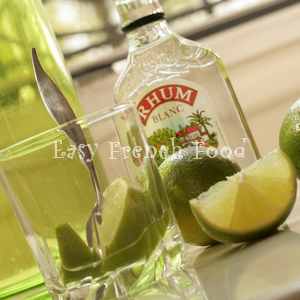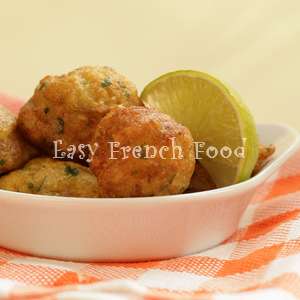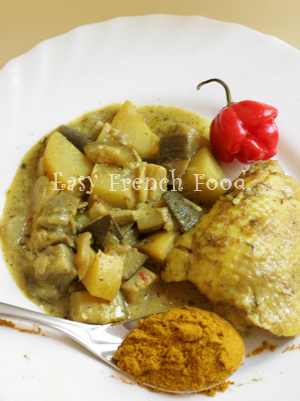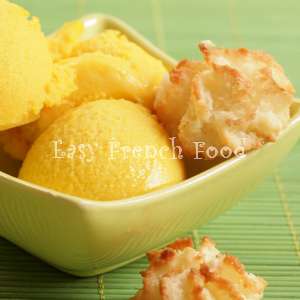
French Guiana Recipes
Issue #19, April 23rd, 2010Bonjour et bienvenue to La Marmite!
This month features some French Guiana recipes. You can serve them all together for a complete menu, or just try one to add a tropical note to your meal.
Ti punch cocktail
°°°
Les accras
°°°
Poulet colombo
°°°
Sorbet à la mangue
French Guiana Cuisine
French Guiana (Guyane) is an overseas department of France located on the north coast of South America. Facing the Atlantic Ocean, and tucked between Suriname and Brazil, the population of Guyane is an unusually diverse mix of people from all over the world - Amerindians, Creoles, West Indians, Brazilians, Indians, Chinese, Hmongs, Europeans, and more. Each of these populations, along with the tropical climate, has influenced the cuisine of Guyane.
Some of the typical foods and French Guiana recipes include:
Blaff - Fish cooked in a spicy broth that might be eaten at breakfast time.
Bouillon d'awara - Arawa is a palm fruit cultivated in French Guiana that serves as the base for this slow cooking stew. The bouillon cooks over 3 days and might contain any number of other ingredients including fish, meat, poultry and various vegetables.
Gibier de bois - Wild game meat includes tapir, pecari, iguana, and agouti, a large rodent!
Couac - A dried, granular form of cooked manioc - served as an accompaniment to many dishes.
Boucanage - This is not a food but a technique for cooking meat and fish. The food is covered in banana leaves and smoked very slowly over an open fire.
Never fear, if you are not feeling up to cooking a rodent or are not able to find couac, for there are many French Guiana recipes that are less exotic and certainly within the range of the average home cook. Here is a sampling to whet
your appetite.
Rum Cocktail
If you happen to visit French Guiana, it won't been long before someone offers you a Ti Punch. Just remember that, if you accept, according to local custom the second drink is obligatory or you risk insulting your host. Rum is of course a specialty of the West Indies and this drink is one of the simplest and most popular ways to enjoy it.
Normally the ingredients are placed on the table along with a few glasses and spoons and everyone mixes their punch to their liking. If you can't find bottled simple syrup, make you own by boiling equal parts of sugar and water, until the sugar has dissolved. Allow to cool before using in your ti punch.

- White rum
- Simple sugar syrup
- Lime wedges
- Ice cubes (optional)
- Squeeze a lime wedge or two into a glass, then drop them in the glass and crush with a spoon.
- Stir in the syrup and then the rum.
- Add ice cubes if desired.
- Sip slowly.
- Have another.
Fish Fritters
Accras are deep fried fish fritters traditionally made with salt cod, but you can substitute fresh cod. Different versions are popular all over the West Indies.
For some reason the hot pepper loses its power in this recipe, so you might want to use a bit more than you think is needed, especially if you like things spicy. Accras can be served as an appetizer or as an accompaniment to the main meal. Indeed, I find them so filling that I don't need much else to make a meal.

- 8 ounces salt cod
- 2 onions, peeled and minced
- 2 cloves garlic, peeled and pressed
- 1 hot pepper, minced finely (more or less to your taste)
- handful fresh parsley leaves, chopped finely
- 1 1/2 tablespoons lime juice
- salt and pepper
- 1 1/2 cups all purpose flour
- 1 cup water
- 2 eggs, separated (at room temperature)
- 1 teaspoon baking soda
- oil for frying
- Begin by soaking the salt cod in a bowl of cold water in the refrigerator for 24 hours, changing the water several times. to remove the salt. Place the desalinated fish in a pot of water and bring to a simmer on medium heat. Simmer for 20 minutes or until the fish is soft and flakes easily. Remove from heat and allow to cool.
- Remove any bones and skin from the fish, and place it in a mixing bowl. Flake the fish with a fork.
- Mix the fish with the minced onions, pressed garlic, minced hot pepper, parsley, lime juice, and salt and pepper to taste.
- Stir in the flour, then beat in the water and egg yolks. Finally, stir in the baking soda.
- In a separate bowl beat the egg whites until stiff, then fold them into the batter.
- In a Dutch oven or similar sturdy cooking vessel, heat 1 inch of oil until it is hot. Drop the batter by spoonfuls into the hot oil. Don't crowd the accras - you'll need to do several batches. Cook until golden brown, turning once. Total frying time is about 2 minutes. Remove and drain on paper towel.
- Serve hot with lime wedges or your favorite dipping sauce.
Makes 3 dozen (or so) accras.
Chicken Colombo
Colombo powder is the West Indian version of curry powder. A spice blend that came to the region by way of Indian immigrants, colombo contains coriander, turmeric, cumin, mustard, fenugreek, pepper, cloves, and rice. Note that it doesn't contain hot pepper and the rice makes it a thickening agent as well as a spice blend.
This recipe begins by marinating the chicken, so be sure to allow plenty of time. Other than that it goes together quickly. Serve this with rice for a complete meal.

- 1 chicken cut up, or 8 pieces of chicken
- 1 shallot, peeled and chopped finely
- 6 cloves garlic, peeled and crushed - divided
- 1 teaspoon ground coriander
- 1 tablespoon white wine vinegar
- 1 cup water
- 3 tablespoons colombo spices - divided
- 3 tablespoons oil
- 2 onions, peeled and chopped
- 1 hot pepper, minced finely (more or less to your taste)
- 1 medium eggplant, cut in 1/2 inch cubes
- 1 medium zucchini, cut in 1/2 inch cubes
- 3 potatoes, cut in 1/2 inch cubes
- juice of 1 lemon
- 1 tablespoon herbes de Provence (or 1 teaspoon each dried thyme, rosemary, and basil)
- 1 cup coconut milk
- salt and pepper
- Make a marinade by mixing the chopped shallot, 4 cloves of crushed garlic, ground coriander, vinegar, water, and 1 tablespoon of the colombo spices in a shallow dish. Salt and pepper the chicken pieces and place in marinade, turning to coat thoroughly. Place in the refrigerator for several hours or overnight.
- After the chicken has marinated (save the marinade), heat the oil in a large and sturdy pot on medium heat. Add the chopped onions, minced hot pepper, and 2 more cloves of crushed garlic. Cook until the onion starts to soften - about 5 minutes.
- Add the chicken and cook, turning occasionally, until the chicken is browned a bit on all sides - about 10 minutes. Add the cubed eggplant, zucchini, and potatoes, the lemon juice, the herbes de Provence (or substitute herbs), and the leftover marinade. Stir to combine well, cover and cook on low medium heat for 15 minutes.
- After 15 minutes stir in the remaining 2 tablespoons of colombo and stir to combine well. Cover and cook another 15 to 25 minutes, or until the chicken is done as you like.
- Stir in the coconut milk and season to taste with salt and pepper. Serve hot with rice.
Makes 4 to 6 servings.
Mango Sorbet
The weather in French Guiana is hot and humid, so desserts naturally tend to the cool and light. This luscious mango sorbet fits the bill. It goes great with coconut macaroons - called les rochers here in France.

- 1 cup sugar
- 1 cup water
- 4 ripe mangoes
- juice of 2 limes
- Place the sugar and water in a small saucepan and bring to a boil, stirring to completely dissolve the sugar. Remove from heat and allow to cool completely.
- Peel the mangoes, then slice the flesh away from the pit. Puree the sliced mango in a food processor. Add the cooled sugar syrup and the lime juice and process until smooth. Pour the puree into a bowl, cover and refrigerate several hours or until completely chilled.
- Place the puree in an ice cream maker and process according to manufacturer's directions. Place the sorbet in an air tight container and freeze for several hours before serving.
What's New at EFF?
- A new section on French cooking schools and classes. If you run a cooking school or class, please write to me and I will try to include your offering on EFF.
- A clasic Peach Melba recipe gets topped with a fabulous raspberry sauce recipe.
- Warm, quick and sure to please, fried Brie cheese appetizers.
- Stuffed zucchini recipe.
- Perfect for your first summer barbecue, cucumber salad recipe.
- A delicious estouffade with next to no effort required, Crock pot beef stew recipe.
- Canned crab gets put to good use in this crab quiche recipe.
Next Issue:
That's it for French Guiana recipes, so until next month kind readers I wish you happy cooking and great eating.
For the next issue, due out on May 25th: the cuisine of the Basque region.
If you're receiving this newsletter because a friend forwarded it to you, you can sign up for your own copy of La Marmite: Subscribe to La Marmite.
You can contact me here if you wish or sign up for the EFF RSS feed here (it keeps you updated on everything I add to the website).
A bientôt and remember to enjoy your food!
Your friend in France,
Kim